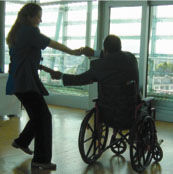Health
 LSN works across the globe to help survivors secure the services they need to help them reclaim their lives. Aiding people injured in landmine accidents helps them move from being victims, to survivors, to fully participating citizens in their communities. First and foremost, LSN helps ensure that survivors have the medical care needed to regain and maintain their health. LSN works across the globe to help survivors secure the services they need to help them reclaim their lives. Aiding people injured in landmine accidents helps them move from being victims, to survivors, to fully participating citizens in their communities. First and foremost, LSN helps ensure that survivors have the medical care needed to regain and maintain their health. Health is the first step in recovery, but even that is difficult for most survivors to find. Estimates are that only about 10% of landmine victims have access to appropriate health care and rehabilitation. For those who need sophisticated post-trauma care, the odds are even lower. In Ethiopia, for example, there are only two orthopedic surgeons for 71 million people. As part of range of services LSN provides, our Networks help survivors access proper health care, rehabilitative services and prostheses.
Even for those who make it to a hospital after an injury and receive effective quality care on that crucial day, the journey is not over. Many have a lifetime of healthcare needs ahead. The majority of the survivors that LSN works with have experienced traumatic limb loss, which brings particular risk factors and conditions. Many of these factors are physical, such as pain in the residual limb, phantom pain, and other experiences. Emotional or psychosocial response can include depression and low self-esteem, further compounded by exclusion from the community, and often their families.
LSN believes that the more survivors know about these conditions, the more power they will have to recover and maintain their health.
LSN Outreach Workers promote survivors’ health by providing survivors and their families with information on all aspects of limb loss. They facilitate survivors’ access to existing health care services by links and referrals to local service providers.
LSN also provides Direct Assistance to survivors. For some, this may include mobility devices, transportation, and medications for immediate needs. In other cases, Direct Assistance grants help to provide immediate relief following an injury, such as purchasing food, clothing so children can attend school, or tools to help repair or outfit the survivors’ home to accommodate their new needs.
Peer support is the hallmark of LSN’s programs. Outreach Workers provide peer-to-peer counseling and support. Amputees themselves, Outreach Workers also serve as role models, showing survivors the possibilities available and engendering new hope for the future. Finally, LSN Outreach Workers help survivors make connections with each other - in some areas this is in the form of social clubs, in others through employment support groups, and for yet others a connection may be the next crucial step to re-entering community life. Rebuilding connections to family and local society help survivors, amputees and people with disabilities — some of the most marginalized and isolated people — return to being productive and contributing members of their communities.
Any day can mark the decisive turning point in a survivor’s recovery. LSN is there throughout ¾ supporting recovery, helping survivors access vocational training and find meaningful work, and learning to advocate for their rights.
The Power to Reach Out
Innovative LSN partnerships have helped to fill healthcare gaps. In El Salvador LSN worked with the Ministry of Health to train 75 nurses and physical therapists for post-amputation treatment response to landmine injuries and to improve patient care. The initial project was so successful that LSN followed with a “Train the Trainers” program so they could share their skills with colleagues at hospitals and clinics throughout the region. LSN-El Salvador held two follow-up trainings for nurses, and visited an additional 12 hospitals to provide information on LSN’s work and distribute Surviving Limb Loss pamphlets. The overall benefit is that more personnel can now provide better care for recent survivors of traumatic limb loss. To date, 27 trainings have been held for health care workers from 35 hospitals.
LSN and the International Committee for the Red Cross (ICRC) conducted a collaborative workshop bringing together Jordanian surgeons from the public sector and the military. The participants were provided with medical information specific to the treatment and care of survivors of landmine accidents.
In Mozambique, LSN published and distributed a national directory of healthcare providers to facilitate the process of linking landmine survivors to existing services.
|